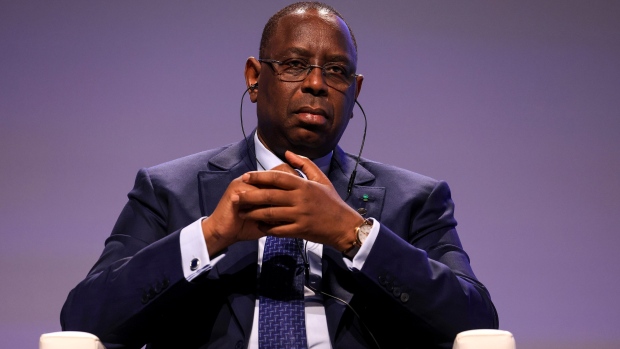Feb 28, 2024
Senegal Opposition Rejects Election Date, Extension of Sall Term
, Bloomberg News

(Bloomberg) -- Senegalese opposition leaders rejected a proposal for the nation’s postponed elections to be held June 2 and that President Macky Sall’s term be extended until a successor is appointed.
The date was put forward by political, religious and civil society leaders after two days of negotiations in the capital, Dakar, aimed at ending weeks of tensions sparked by Sall’s Feb. 3 decision to delay the vote. Seventeen of the 19 opposition candidates on the ballot boycotted the talks, and their rejection of the proposal raises the prospect of renewed protests if the president agrees to the plan.
“Even if the dialog reaches a consensus, it cannot overrule the law,” Thierno Alassane Sall, a former minister and presidential candidate, said in a post on X. “Holding the presidential election after April 2 is against the constitution.”
Wrangling over the date for elections that were supposed to take place on Feb. 25 has destabilized Senegal, traditionally considered one of the continent’s most stable democracies. The postponement of the vote sparked violent protests, a government crackdown on the opposition and a selloff of the nation’s dollar bonds that’s placed them among the worst emerging-market performers this year.
Sall’s term expires on April 2, and while the president has previously said he plans to abide by a Constitutional Council ruling that he must step down by that date, he’s yet to respond to the proposal that he remain in power.
Sall will receive the recommendations of the national talks on March 4 and will seek the opinion of the council to arrive at a decision, according to minutes from a cabinet meeting Wednesday. Prolonging his stay in office risks provoking renewed protests in the West African nation.
“I hope that the Constitutional Council will remind him of the law and that ultimately President Macky Sall will organize the polls before leaving,” said former Prime Minister Aminata Toure, a leading opposition member who was once a close Sall ally. “By seeking to set the date to June 2, it opens up institutional uncertainty which could lead to an institutional crisis.”
Toure’s candidacy was previously rejected by the council, but may be reconsidered, according to the panel’s proposal, paving the way for Toure and other previously disqualified candidates to participate in the election.
Read More: Senegal’s Sall Seeks to Calm Tension With Pledge to Step Down
The yield on Senegal’s dollar debt due in 2033 rose five basis points to 8.99% on Wednesday, while the rate on its 2037 securities climbed by the same margin to 9.34%.
Sall postponed the election citing a need to defuse tensions over the verification process of Senegal’s presidential candidates. Lawmakers later approved a constitutional change to facilitate the delay and extend the president’s mandate, which led to protests in which at least three people died. The Constitutional Council ruled the amendment unlawful.
The nation’s top court also said the election should take place as soon as possible, without specifying a date. Sall convened the national dialog to chart a way forward.
“The Constitutional Council was very clear that the president’s term ends April 2 and his mandate can’t be extended,” said Babacar Ndiaye, a political analyst with West Africa think tank Wathi. “I don’t see how they can backtrack on their decision.”
Senegal’s constitution states that the office of the president passes to the parliamentary speaker in the event of a vacancy and fresh elections must be held within 90 days. The nation’s laws provide for a campaign spanning three weeks and say a vote must be held at least one month before the president’s term expires.
The government on Wednesday adopted an amnesty bill introduced by Sall to free political protesters from detention. The bill, which needs the approval of lawmakers could see some of his opponents — including the nation’s main opposition leader, Ousmane Sonko, released before the vote.
(Updates with latest bond prices in ninth paragraph.)
©2024 Bloomberg L.P.








